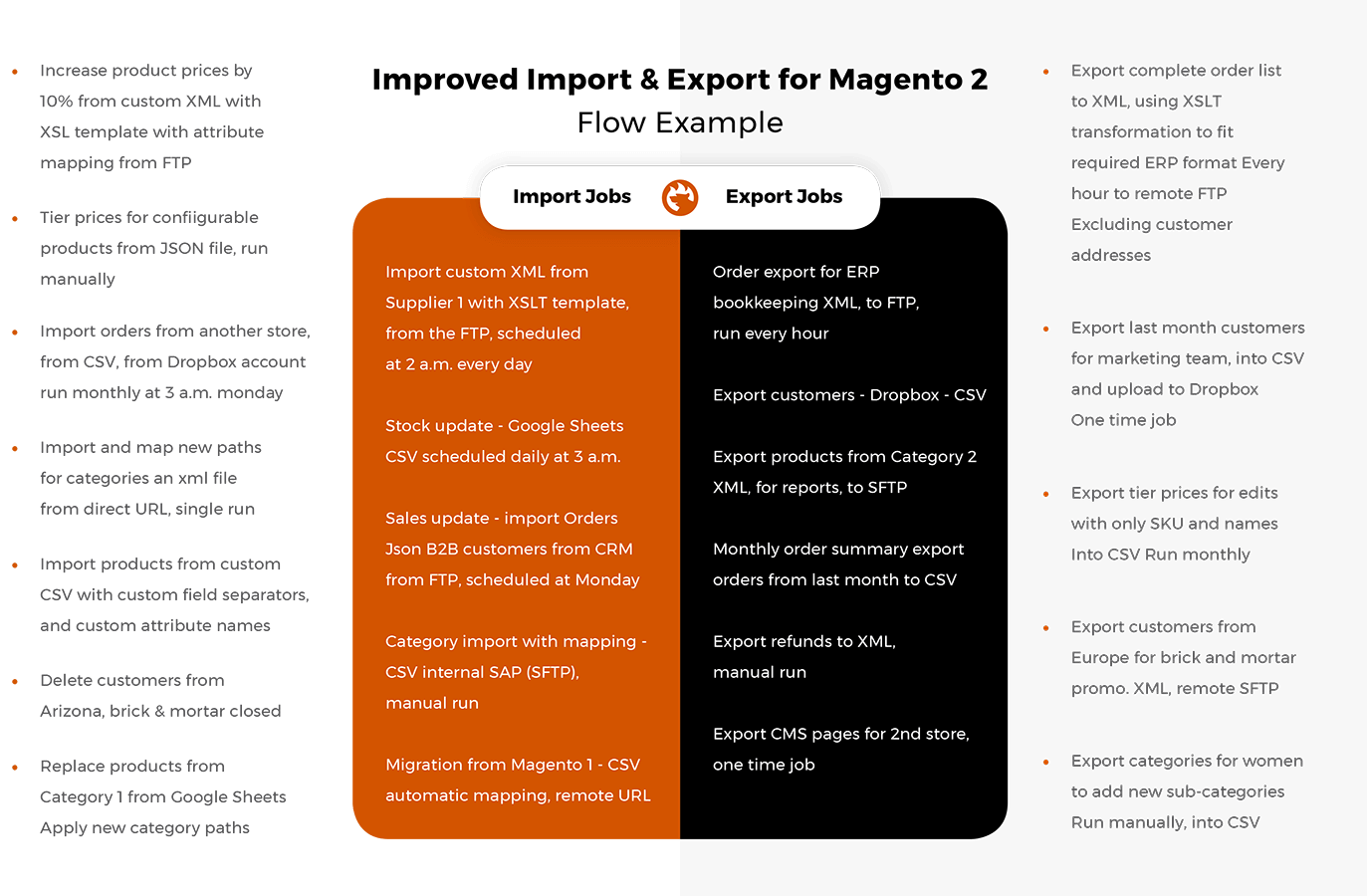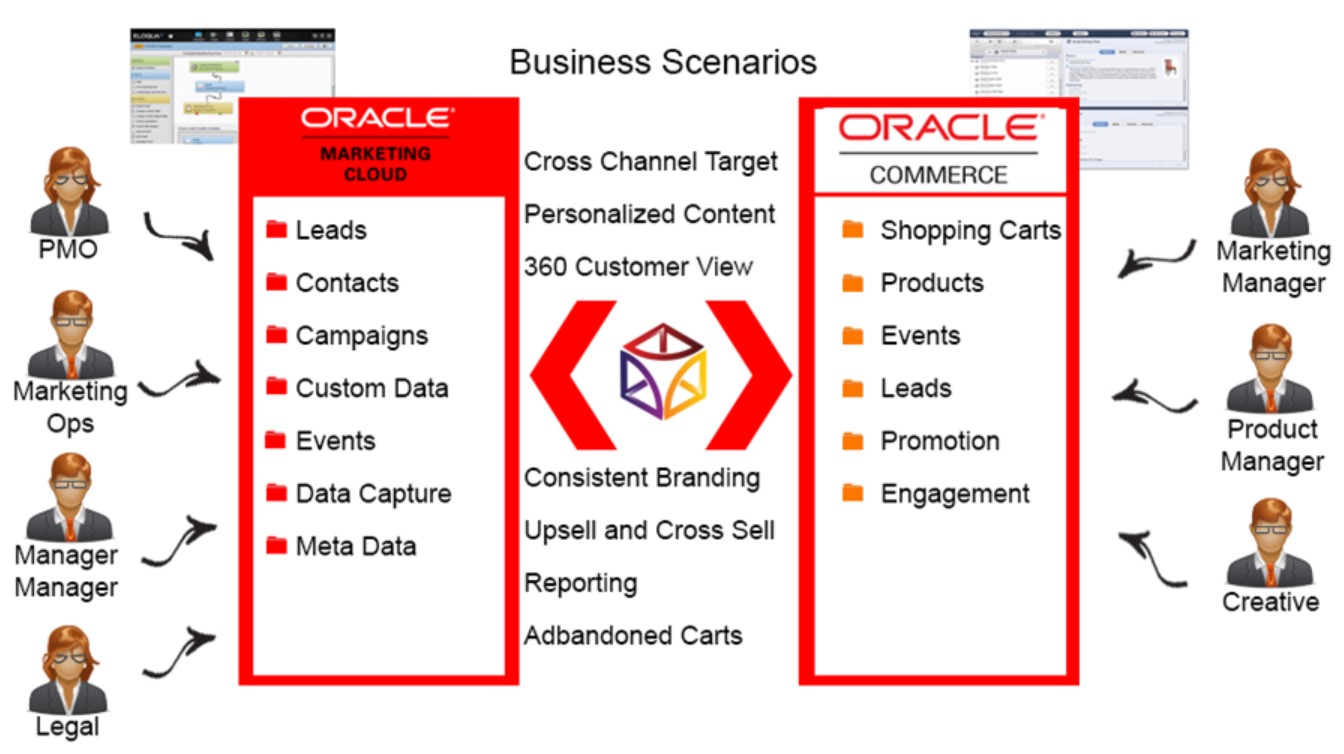Firebear Improved Import & Export Plugin for Oracle Commerce Cloud

We already provide extended integration capabilities for Magento 2 and the Oracle ecosystem with our NetSuite Integration Add-on for Magento 2. The tool works on top of the Improved Import & Export extension and offers automated data transfers between the two systems. However, it is not the only way we interact with Oracle. In the article below, we shed light on our new project – the Firebear Improved Import & Export extension for Oracle Commerce Cloud.

While our Improved Import & Export module for Magento 2 provides tons of enhancements to the default import and export tools of the platform as well as incorporates numerous improvements, we want to achieve the same goals with the corresponding Oracle project. Our Magento 2 plugin is 100% unique in comparison to the existing rivals, so we want to introduce something similar in terms of the Oracle ecosystem. Besides, our experience ensures that Oracle’s import and export solutions lack numerous features we can provide.
In this article, you will find the key milestones that we’ve already achieved with our Magento 2 tool, as well as the vision of our new project from this perspective. We shed light on the core features of the Firebear Improved Import & Export application for Oracle Commerce Cloud and compare it with the existing import and export tools of the platform. Also, note that it is already possible to get access to the extension’s beta version. Please, contact us for more detail.
Table of contents
The Leading Import & Export Solution for Magento 2
The Improved Import & Export Magento 2 extension has already become the number one data transfer tool in the ecosystem. Merchants all over the world incorporate it to simplify their daily data transfer workflows and automate import and export processes.
Our module provides a more extended range of features than most rival import/export modules offer, not to mention the default capabilities of Magento 2. While the existing third-party data transfer solutions are usually aimed at specific integrations only, the Improved Import & Export extension lets you connect to any external system.
Besides, the module enables more simple integrations with particular systems via add-ons. The standalone extension provides full data transfer automation, support for various file formats/sources, numerous mapping features, API transfers, Google Sheets import, etc. An add-on tailors these features according to the requirements of a particular platform. As you can see, it is possible to leverage Improved Import & Export to improve, enhance, and automate your integrations with any external platforms.
Other essential aspects of the Improved Import & Export Magento 2 extension include:
- Outstanding quality is proven by the Magento Marketplace, SAP Partner Open System, Microsoft Partner Network, and Magento Extension Developers Network (ExtDN) as well as such prominent extension users as Nestle, Acer, Tabasco, etc.
- 100+ features.
- Integration add-ons for NetSuite, SAP, MS Dynamics, and other systems.
- Firebear is an Adobe Bronze Solution Partner with a team of Certified Magento 2 developers.
- We work with BORN, IWD, SmartOSC, Inchoo, and other companies that use our extension to deliver the best data import and export solution to their clients.
Today, we announce a journey to the Oracle Commerce Cloud ecosystem. Our goal is the ultimate data transfer solution, and our team knows how to achieve it. Contact us for further information and the early access to the Improved Import & Export extension for Oracle Commerce Cloud. We shed light on its core functions and features below.

Improved Import & Export For Oracle Commerce Cloud
The Improved Import & Export extension for Oracle Commerce Cloud provides numerous improvements that make data transfers easier. Below, you will find the key features the tool offers.
Import & Export Jobs
The extension offers import and export jobs – standalone profiles where you configure each data transfer. It is possible to create a job per entity. At the same time, you can use multiple import and export profiles for the same object, transferring one entity to/from numerous platforms simultaneously. Also, note that it is possible to apply individual configuration per job with the Improved Import & Export extension, so a unique condition for every data transfer can be created.
Data Transfer Automation
The Improved Import & Export extension for Oracle Commerce Cloud lets you avoid manual transfers. There are two ways to do that: create a schedule of updates or specify an event that automatically launches a data transfer.
Schedules
Every import/export job contains a schedule configuration section, where you can choose a predefined value and customize it if necessary. Feel free to create a new one manually, if applicable.
Events
Event-based data transfers incorporate a different principle. You rely on rules, conditions, and triggers to enable automation. The Improved Import & Export extension for Oracle Commerce Cloud lets you choose an activity that becomes a trigger. Then, the selected event launches import or export processes.
As we’ve mentioned above, it is also possible to specify conditions/rules to make transfers more precise. Event-based triggers are suitable for both import and export processes.
Data Mapping
Different data storing standards cause lots of obstacles when you try to import information from one system to another. It is always necessary to edit data files before importing them into the system. However, you can forget about headaches related to these processes since the Improved Import & Export Magento 2 application for Oracle Commerce Cloud introduces several robust mapping features. It lets you use presets to match external attributes to ones used in Oracle Commerce Cloud, utilize a grid for manual mapping, leverage instruments for attribute value matching and editing, and implement several more tricks.
Mapping Presets
Presets introduce the most straightforward way of mapping since it is only necessary to select and apply a matching scheme suitable for your integration to fix unsupported external designations. The Improved Import & Export Oracle Commerce Cloud extension does all the work for you. It scans the input file, discovers third-party attributes, and replaces them with suitable values. As for export presets, they incorporate the same principle. You select a predefined mapping scheme only one time. Next, the module applies it automatically.
Matching Interface
Besides, the Improved Import & Export extension for Oracle Commerce Cloud enables manual attribute matching. You can find a corresponding section in every import or export job. It lets you map attributes as follows: specify an external attribute, set a replacement, repeat these actions until no third-party designations are left. The best thing about this mapping feature is that all these changes are saved for further updates. The extension applies them manually during every transfer.
Attribute Values
Attributes are not the only data type that is a subject of mapping. The Improved Import & Export Oracle extension lets you apply the same transformations to attribute values. When mapping is not enough, the module comes in handy. It provides attribute values editing capabilities so that you can combine or split designations as well as add prefixes/suffixes in bulk.
Filters
Filters introduce another feature that is worth your attention. You can effortlessly narrow down the selection of data in every export file with the Improved Import & Export extension. Specify what particular attributes you want to move, and the module will create a corresponding output so that you provide an external platform with the data it needs.
Categories
Besides, you can leverage category mapping. The Improved Import & Export extension for Oracle Commerce Cloud lets you link imported products to any existing category in your catalog. You can also create new categories on-the-go.
Attributes On-The-Fly
When a data file lacks attributes, it is no longer an issue. The Improved Import & Export tool for Oracle Commerce Cloud allows creating attributes on-the-fly. If some rows of a data file are empty, you can generate the corresponding attributes automatically.
Extended Connectivity
The extended connectivity options of the Improved Import & Export Oracle Commerce Cloud module dramatically enhance the default data transfer capabilities of the platform since they add many more useful options. Our extension lets you transfer information to and from your Oracle Commerce Cloud via different file formats and sources. Besides, you can use API integrations or Google Sheets.
File Transfers
The Firebear Improved Import & Export extension for Oracle Commerce Cloud supports CSV, XML, JSON, ODS, and Excel file formats. You can import/export data in these standards from/to a local or remote server (FTP/SFTP), Dropbox account, or directly from URL.
Alternative Transfers
Most e-commerce platforms don’t offer alternative data transfers. However, it is possible to enable them with the help of third-party solutions, such as the Improved Import & Export extension by Firebear. As we’ve just mentioned, you can rely on direct Google Sheets import and API integrations.
In the first case, it is only necessary to specify a URL address of a table with the data you want to import. After that, the module does all the work for you. As for API connections, they are a little bit more complicated, but an intuitive admin interface of our extension lets you freely master them.
Now, let’s take a look at the Oracle Commerce Cloud platform, its import and export features, and corresponding third-party solutions. Contact us to get access to the beta version of the Improved Import & Export extension for Oracle. You can also ask any questions to get more information about it.
Oracle Commerce Cloud Features

Oracle Commerce Cloud provides the ability to simplify various digital processes. The platform offers tools necessary for connecting and supporting digital interactions between you and your customers. You get a bunch of pre-integrated features, such as drag-and-drop tools or automatic upgrades. Like Magento, Oracle delivers multiple websites and business models in a single place.
You can easily satisfy consumer demands and stay ahead of competitors with unique experiences the platform offers. Oracle lets you experiment and adapt with less risk due to a modern and unified CX platform with unique customization opportunities and Adaptive Intelligent Apps. It delivers consistent and personalized customer experiences on all devices and platforms, tending to increase engagement, sales, and loyalty. Oracle Commerce Cloud provides such features as integrated AI, personalization tools, various loyalty mechanisms, and native A/B tests to help you interact with store visitors more efficiently.
At the same time, you can leverage Oracle integrations and open architecture to connect additional technologies and features to deliver even more outstanding experiences. Prebuilt integrations and various Oracle Cloud services allow you to simplify development and integration while reducing costs.
Oracle accelerates business transformation due to increased agility, lower TCO, and reduced IT complexity. Its cloud services are delivered via scalable, flexible, and customizable SaaS infrastructure. As a merchant, you can benefit from automatic upgrades, top-notch security level, and default PCI and GDPR compliance. Find more information here: .
Existing Import & Export Solutions for Oracle Commerce Cloud
Now, let’s see what native import/export instruments are available in Oracle Commerce Cloud, what are their rivals, and how to create alternatives.
Default Data Transfer Capabilities of The Platform
By default, the system lets you export products, SKUs, and collections, edit them outside of Oracle Commerce Cloud, and reimport changes back. Thus, it is possible to create an entire catalog or apply changes to an existing one and related products using data transfers. Besides, the system lets you import inventory data, such as inventory count and stock threshold. You can also add translations for each language your store supports in the same manner.
Import
The import feature of Oracle Commerce Cloud provides the ability to work with products, SKUs, and collections. You can transfer them in a spreadsheet format. As a result, there is a convenient method for adding items or editing them in bulk available by default.
Another import opportunity is related to inventory data. You can import all the corresponding details for products and SKUs into your catalog.
Note that importing inventory and products/SKUs/collections are two separate procedures. However, they follow the same algorithm:
- Create a spreadsheet that suits Oracle Commerce Cloud requirements.
- Load and validate the file.
- Import the spreadsheet.
- Review the outcome for errors or warnings.
- Review the imported items in your catalog.
That’s it! The procedure is similar to a default import routine of every e-commerce platform. It also has some common drawbacks that often appear in native data transfer tools.
Export
When it comes to the export processes of Oracle Commerce Cloud, it is only possible to export products, product variants (SKUs), and collections. The system lets you transfer only one entity in each export procedure. For instance, two different processes are required for moving products and collections from your e-commerce store.
At the same time, the system transfers all properties available for each entity. It means that you cannot select the attributes you want to export.
Another strange thing is that the system transfers changes that are applied to products and other entities but not published yet. It seems to be an unavoidable obstacle.
As you can see, the default import and export capabilities of Oracle Commerce Cloud are very restricted. You can import and export only a few entities. There is no automation. It is possible to transfer data via a spreadsheet only. The default import/export tools of Oracle Commerce Cloud lack mapping presets, filters, schedules, triggers, API transfers, and even support for various file formats and sources. Perhaps, a situation with third-party data transfer extensions is better. Let’s find out!
Third-party Import And Export Plugins
You can find several replacements for the default import and export tools on the Oracle Cloud Marketplace, but Oracle does not endorse any of the third-party solutions listed on the website unless they are provided by the company itself. Thus, the company disclaims all liability arising from the use of Oracle Cloud Marketplace. Therefore, let’s take a look at two different solutions: a third-party extension and Oracle’s native tool.
Oracle Commerce Cloud Integration for Oracle Marketing Cloud

Put it Forward provides a solution designed to help with active integrations between Oracle Commerce and Marketing Clouds. The tool lets you leverage the most current customer data to create real-time cross-channel retargeting campaigns, increase the level of personalization, reduce cart abandonment, have a complete view of customer data across multiple channels, etc.
The problem is that you cannot transfer all the necessary information between the two systems using the default Oracle tools. Therefore, such integrators are required. However, they are limited to the only goal – the synchronization of the two particular platforms. Unfortunately, we didn’t find any multipurpose import/export solution on Oracle Cloud Marketplace.
As for the extension’s price, it varies depending on a selected tier. You need to contact the vendor for further information.
Oracle Commerce Cloud to Oracle Order Management Cloud | OIC Recipe

You can also find a free data transfer extension developed by Oracle. The solution enables a real-time transfer of orders from Oracle Commerce Cloud to Oracle Order Management Cloud. As a result, you can use Oracle Commerce Cloud and Oracle Order Management Cloud together to leverage a robust system for order capturing and fulfillment.
The extension not only lets you pass orders created in Oracle Commerce Cloud to Oracle Order Management Cloud but also retrieves and updates the corresponding statuses in both systems in real-time. Besides, the extension makes it easier to submit returns and exchanges to Oracle Order Management Cloud.
The best thing about the solution is that it is free and fully optimized for both platforms.
As you can see, both tools are limited from the perspective of what data they can transfer and what platforms they work with. However, if you need a universal import/export extension, you still have an opportunity to get one, using the system’s APIs.
Import & Export via API
Oracle Commerce Cloud lets you use the REST APIs that consist of several endpoint sets:
- Store API Endpoints. You can use them to access the storefront.
- Admin API Endpoints. These endpoints enable administrative functionality.
- Search and Navigation API endpoints. These APIs are a subset of the Admin API endpoints. They provide access to search functionality on the server.
- Agent API Endpoints. These APIs can be utilized for recreating agent functionality on the administration server.
- Social Wish Lists API Endpoints. Use these endpoints to configure wish list features.
Note that each set of endpoints is unique. However, similar endpoints may be available in different APIs. Thus, the Store, Agent, and Admin APIs contain endpoints for processing orders, but the functions they can perform are not the same.
Also, note that each API is available in a specific environment only. For instance, the administration server is a home for the Admin and Agent APIs, which are not represented on the storefront server, while the Store API is partly available on both servers. For further information, follow this link: .
However, creating a multipurpose import and export extension with the help of the Oracle API is not an easy task. You need to have experience in this area, learn lots of new information, and spend hours developing your custom project. Instead, you can leverage our Improved Import & Export Oracle Commerce Cloud extension to get the lacking functionality.
Final Words
Oracle Commerce Cloud is a fully-featured e-commerce solution. However, it doesn’t offer any powerful data transfer tool that can compete with our extension. The system lacks a robust data import/export extension even when it comes to third-party vendors. Therefore, we want to provide Oracle merchants with the Improved Import & Export app to cover their data transfer needs and fix the data transfer bottlenecks of the ecosystem. Contact us to get your access to a free beta version of the Improved Import & Export Oracle Commerce Cloud extension and streamline the following features:
- Flexible import and export profiles;
- Numerous file formats;
- Multiple file sources;
- Data transfers via APIs;
- Import from Google Sheets;
- Support for files with thousands of products;
- Presets for mapping + manual matching;
- Triggers and schedules for automated data transfers.

